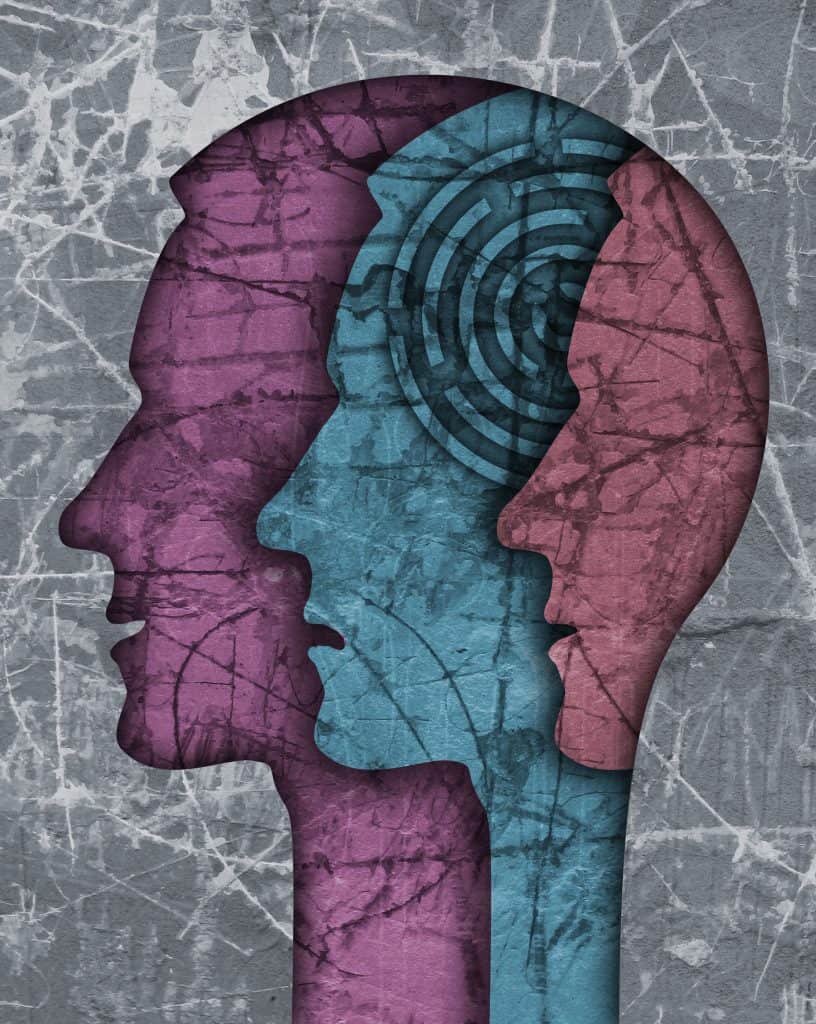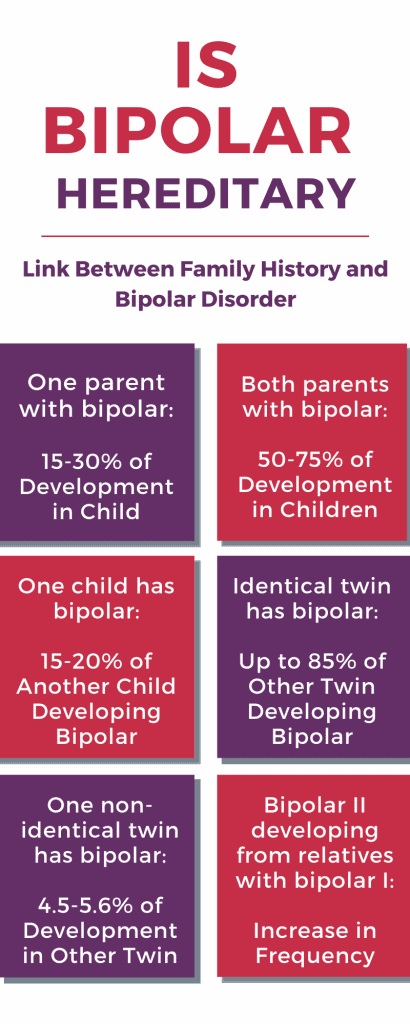Is Bipolar Disorder Hereditary? Probabilities and Symptoms!
Posted by Prescription Hope - See Editorial Guidelines (Last Updated On: Mon Jul 10 2023)
Bipolar disorder is a long-term but manageable condition that affects a person’s mood.
The highs and lows that are generally characteristic of bipolar disorder might affect how a person feels, thinks, and behaves.
For those suffering from bipolar disorder, you might be wondering if bipolar disorder hereditary. In this article, we will explore the facts to help you more easily understand.
Let’s start first with the short answer before we get into the details.
Is bipolar disorder hereditary? If a parent has bipolar disorder, there’s a 10% chance that their child will develop the illness and a 40% chance if both parents have bipolar disorder. Bipolar disorder is the most likely psychiatric condition to be passed on in families. Genetic factors account for around 80% of the cause of bipolar.
With the brief explanation in mind, let’s head into the details of what bipolar is, so we can more easily understand if bipolar is hereditary.

What is Bipolar Disorder?

Bipolar disorder is a condition that fundamentally affects how you feel and your mood.
According to the World Health Organization, over 45 million people worldwide have bipolar disorder. Historically, bipolar was known as manic depression, but that description has since changed.
Individuals that have bipolar may experience episodes of mania and depression. These episodes can affect your energy levels and the way you act.
Those with bipolar disorder may feel well between episodes but the symptoms can significantly affect areas of your life such as relationships, work, and school.
Bipolar I and Bipolar II
There are two recognized types of Bipolar. Bipolar I and Bipolar II.
- Bipolar I disorder involves periods of severe mood episodes from depression through to mania.
- Bipolar II disorder is a less severe form that involves minor hypomania episodes and periods of severe depression.
What are the Symptoms of Bipolar?
- Some of the depressive symptoms of bipolar include low self-esteem, lack of energy, feeling worthless, and in worst cases, suicidal thoughts.
- Bipolar disorder can cause extreme mood swings from very high to very low
- Another symptom of those with bipolar may include psychotic events. These symptoms include hearing and seeing things that seem real, although they don’t exist.
- Manic episodes typically involve either an irritable or elevated mood, periods of over-activity, swift speech, inflated self-esteem or overly confident, and decreased requirement for sleep.
- Those who suffer from manic episodes will have symptoms like impulsive behavior, agitation, excitement, and increased feelings of energy.

How is Bipolar Caused?
According to the Institute of Mental Health, genetics is an important factor in determining whether you might suffer from bipolar. Bipolar disorder can run in families, so many experts believe that genes play a role in its development.
Biological traits and environmental factors may also play an important role in those who have this condition.
- Genetic factors: Bipolar disorder is more common in those who have a family member with the condition. Several genetic features may be involved.
- Environmental factors: Life events, such as abuse, mental stress, a significant loss, or another traumatic event, may trigger an initial episode in a susceptible person.
- Biological traits: Research suggests that imbalances in neurotransmitters or hormones that affect the brain may play a significant role in the development of bipolar.
This shows that heredity isn’t the only cause of the bipolar disorder.
It also means that you won’t definitely or automatically develop it if you have a family history of the disorder.
So, is bipolar disorder hereditary? We can say that most family members of someone with bipolar disorder will not develop the condition. However, the risk does increase if the family member with the condition is a close relative.
So, you will have a greater chance of developing it if one of your parents has it versus if your uncle or a distant relative.
What is the Role of Genetics in Bipolar Disorder?
According to The Journal of Medical Genetics, bipolar is significantly influenced by genetics. In a recent article, it’s described by them as a ‘complex genetic disorder.’
While researchers don’t fully understand the causes of bipolar disorder and the answer to is bipolar disorder hereditary is vague, some risk factors have been identified.
Family History of Bipolar Disorder
Throughout the decades, medical experts have been aware that bipolar disorder often tends to run in families. One of the greatest factors for increased risk is family history.
This connection may be due to certain genes, although further research is needed to determine which gene or genes are more likely to result in a case of bipolar within a family.
Although research has been carried out up until the time of writing, there have been no robust positive findings.
Studies that have concentrated on the genetics of bipolar disorder have so far failed to find a gene that may be causative.

Is Bipolar Disorder Hereditary – Recent Research
With regards to recent research, it appears that there might be many different types of genes that combine to raise a person’s susceptibility to the disorder.
However, it appears that in the near future, specific bipolar susceptibility genes will be identified, which will have a notable impact on our understanding of this disorder.
Over the last 30 years, many studies using the modern concept of bipolar disorder have been conducted. One particular study measured the lifetime risk of developing bipolar from first-degree (parent, full sibling, or child) relatives.
Let’s take a look below at some of the data of that study, which found a significant link between family history and bipolar disorder:
- One parent with bipolar: A child of one parent with bipolar disorder and one without has a 15% to 30% chance of developing bipolar.
- Both parents with bipolar: If both parents have bipolar disorder, there’s a 50% to 75% chance that any subsequent children they have may also suffer.
- One child has bipolar: If one of your children has bipolar, there is a 15% to 25% chance that any other of your children will have bipolar.
- An identical twin has bipolar: When it comes to identical twins, if one twin has symptoms of bipolar, then the chances of the other twin becoming a sufferer leaps to a significant 85%.
- One non-identical twin has bipolar: In this case, the percentage likelihood of the other non-identical twin developing Bipolar syndrome varies between 4.5% and 5.6%.
- Bipolar II developing from relatives with bipolar I: Bipolar II has been shown to occur with increased frequency in relatives of bipolar I compared with the general population.
Also, read our article to understand the difference between Bipolar and Unipolar.

To Close
If you’re concerned that you may be prone to developing bipolar disorder due to a history of the condition in your family, then you will most likely not develop it. But it is certainly worth keeping in mind when you feel it may be a factor.
If you’re in any doubt or need further checks and information, then consult your doctor. They will be able to advise you and recommend a course of action.


